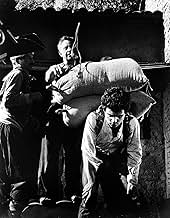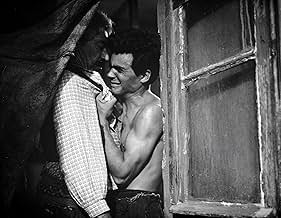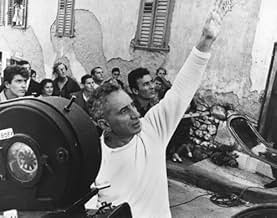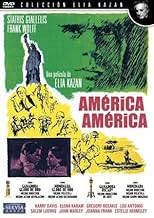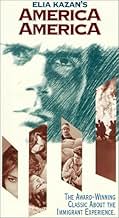CALIFICACIÓN DE IMDb
7.7/10
6.3 k
TU CALIFICACIÓN
Un joven griego no se detiene ante nada para asegurarse un pasaje a América.Un joven griego no se detiene ante nada para asegurarse un pasaje a América.Un joven griego no se detiene ante nada para asegurarse un pasaje a América.
- Dirección
- Guionista
- Elenco
- Ganó 1 premio Óscar
- 7 premios ganados y 12 nominaciones en total
Garrett Cassell
- Dog Walker
- (sin créditos)
Tom Holland
- Voice Overs
- (voz)
- (sin créditos)
Elia Kazan
- Self
- (voz)
- (sin créditos)
- Dirección
- Guionista
- Todo el elenco y el equipo
- Producción, taquilla y más en IMDbPro
Opiniones destacadas
This is a superb piece of filmmaking which has, unfortunately, been all but forgotten. The only weakness is in its star (Stathis Gialellis), but the film is so good that it doesn't matter (and, on second viewing, he's really not all that bad). I have seen this film many, many times on video and once I was privilaged to see it on on the "big Screen" at the Los Angeles County Museum of Art. I highly recommend it. The black and white cinematography by Haskell Wexler is top-notch. This film is a testament to the human spirit.
"America, America" deserves a modern audience but is almost impossible to find. I just viewed a VHS version obtained through the inter-library loan program. I live in Virginia and it was sent down from Alaska!
This film should be required viewing for anyone interested in understanding why the huddled masses flocked to America but it is highly personalized and focused on a young man from a middle class Greek family with a big dream that seems impossible to fulfill. Another reviewer correctly likened Stathis Giallelis to a young Brando for his overpowering individuality, determination, and (for Turkish society in 1900) swagger. But when his character Stavros grows a mustache, he becomes a young Omar Sharif. AA is brilliantly written and directed by Elia Kazan.
This film should be required viewing for anyone interested in understanding why the huddled masses flocked to America but it is highly personalized and focused on a young man from a middle class Greek family with a big dream that seems impossible to fulfill. Another reviewer correctly likened Stathis Giallelis to a young Brando for his overpowering individuality, determination, and (for Turkish society in 1900) swagger. But when his character Stavros grows a mustache, he becomes a young Omar Sharif. AA is brilliantly written and directed by Elia Kazan.
"America, America" is a movie made with the soul. It is a hair-raising movie about the immigrant experience, made by artists temporarily outside the Hollywood cage. It is about the struggle to be human in a world that bites at you, and it is about naked desire. "America, America" is a film about a young man with ichor in his arteries, made by people with ichor in their arteries.
Stavros is a young Greek from Anatolia, a youth with burning eyes, full of ethos as well. He yearns to live a life away from degradation (Greeks in Anatolia were a despised minority). This movie shows his peregrination to America, in three of the shortest hours I've ever lived. It shows a cycle of being broken and rebuilt over and again, the death of illusions, the obduracy of hope, and the rack of desire.
Haskell Wexler deserves special mention as he quite frequently produced jaw-dropping shots in this movie. There is a scene in this movie where Stavros is sat next to an older woman, Sophia (sat together like panthers watching an ape play with jackals), and the electricity between them, established entirely visually, is a devastation.
The editing from Dede Allen, is similarly special, and you can see that Kazan acknowledged all this creative talent as he reads out all the names of the major creative staff at the end over the credits. One particularly beautiful effect was a dissolve the last time we see Stavros' mother, where her face persist on the screen for a moment, almost as if she has become a ghost.
You absolutely must see this movie.
Stavros is a young Greek from Anatolia, a youth with burning eyes, full of ethos as well. He yearns to live a life away from degradation (Greeks in Anatolia were a despised minority). This movie shows his peregrination to America, in three of the shortest hours I've ever lived. It shows a cycle of being broken and rebuilt over and again, the death of illusions, the obduracy of hope, and the rack of desire.
Haskell Wexler deserves special mention as he quite frequently produced jaw-dropping shots in this movie. There is a scene in this movie where Stavros is sat next to an older woman, Sophia (sat together like panthers watching an ape play with jackals), and the electricity between them, established entirely visually, is a devastation.
The editing from Dede Allen, is similarly special, and you can see that Kazan acknowledged all this creative talent as he reads out all the names of the major creative staff at the end over the credits. One particularly beautiful effect was a dissolve the last time we see Stavros' mother, where her face persist on the screen for a moment, almost as if she has become a ghost.
You absolutely must see this movie.
I first saw America, America when it was originally released and I saw it with my father. When the lights came up, I looked at my father and there were tears in his eyes and he said "this is my story too". His journey to America was the same as the character in the movie, only he came from Armenia.
Elia Kazan, with this movie has told the story of many immigrants, just like my father, with truth and depth of character. This isn't a fairy tale, the story is real and reflects the perils and experiences many immigrants took to come to
America. I am amazed that more people don't know about this movie. Whenever I rewatch it, I am reminded of the sacrifices my father made to come to this country and why I'm am blessed to be an American.
Elia Kazan, with this movie has told the story of many immigrants, just like my father, with truth and depth of character. This isn't a fairy tale, the story is real and reflects the perils and experiences many immigrants took to come to
America. I am amazed that more people don't know about this movie. Whenever I rewatch it, I am reminded of the sacrifices my father made to come to this country and why I'm am blessed to be an American.
I saw America America way back when I was a teen and had not seen it since till
today. I was surprised at how much I remembered of it. It was like reliving tales
told by my grandparents and some of their siblings of their immigration stories.
In this case this was fashioned tales of Elia Kazan's parents and their siblings woven together to create an immigrant story. It's not pretty at times and the black and white cinematography accents the harshness of the experience.
Kazan's protagonist is young Stathis Giallelis and a few familiar character actors are in the cast. No box office names though to accent the reality of the story. Giallelis is a Greek in Turkish Anatolia, a place where during the Ottoman Empire persecuting Greeks and Armenians was a national pasttime. Not that persecution led to any kind of solidarity, the two minorities had it in for each other as much as the Turks.
Giallelis hears of America, a fabled land where this sort of organized persecution and permanent status at the bottom of society doesn't happen. He resolves to go, but his family only sends him as far as Istanbul (as Greeks they still call it Constantinople)to help out one of the relatives.
He hears the fare is 110 English pounds and one way or another he's going.
The last 15 minutes or so is when Giallelis arrives and there's a compelling montage of immigrants including our protagonist doing all kinds of menial jobs that we who are here won't do. It's no different today with the current folks who want to come here, the ones our current administration is bent on scapegoating for its own purposes. Look folks, that montage tells more than the Kazan family story. it's your story or mine unless you were born an American Indian.
And speaking for the Kogans, Lucyshyns, Scrobacks, and Fleischmans, I'm glad Elia Kazan made America America and told the tale.
In this case this was fashioned tales of Elia Kazan's parents and their siblings woven together to create an immigrant story. It's not pretty at times and the black and white cinematography accents the harshness of the experience.
Kazan's protagonist is young Stathis Giallelis and a few familiar character actors are in the cast. No box office names though to accent the reality of the story. Giallelis is a Greek in Turkish Anatolia, a place where during the Ottoman Empire persecuting Greeks and Armenians was a national pasttime. Not that persecution led to any kind of solidarity, the two minorities had it in for each other as much as the Turks.
Giallelis hears of America, a fabled land where this sort of organized persecution and permanent status at the bottom of society doesn't happen. He resolves to go, but his family only sends him as far as Istanbul (as Greeks they still call it Constantinople)to help out one of the relatives.
He hears the fare is 110 English pounds and one way or another he's going.
The last 15 minutes or so is when Giallelis arrives and there's a compelling montage of immigrants including our protagonist doing all kinds of menial jobs that we who are here won't do. It's no different today with the current folks who want to come here, the ones our current administration is bent on scapegoating for its own purposes. Look folks, that montage tells more than the Kazan family story. it's your story or mine unless you were born an American Indian.
And speaking for the Kogans, Lucyshyns, Scrobacks, and Fleischmans, I'm glad Elia Kazan made America America and told the tale.
¿Sabías que…?
- TriviaOf all the films he had directed, this one was Elia Kazan's favorite film, as it was very personal to him.
- ErroresAn old woman is humming a tune from Astor Piazzolla's Libertango in the 1900s, decades before the composer was even born.
- Citas
Elia Kazan: [Voice- over] My name is Elia Kazan. I am a Greek by blood, a Turk by birth and an American because my uncle made a journey.
- Créditos curiososDirector Elia Kazan narrates the main portion of the closing credits, reading the words as they appear on the screen, using complete sentences such as "The cinematography was by Haskell Wexler."
- ConexionesEdited into Grand format: Amérique, notre histoire (2006)
- Bandas sonorasExcitement In The Village
Selecciones populares
Inicia sesión para calificar y agrega a la lista de videos para obtener recomendaciones personalizadas
- How long is America America?Con tecnología de Alexa
Detalles
- Tiempo de ejecución
- 2h 54min(174 min)
- Color
- Relación de aspecto
- 1.85 : 1
Contribuir a esta página
Sugiere una edición o agrega el contenido que falta







